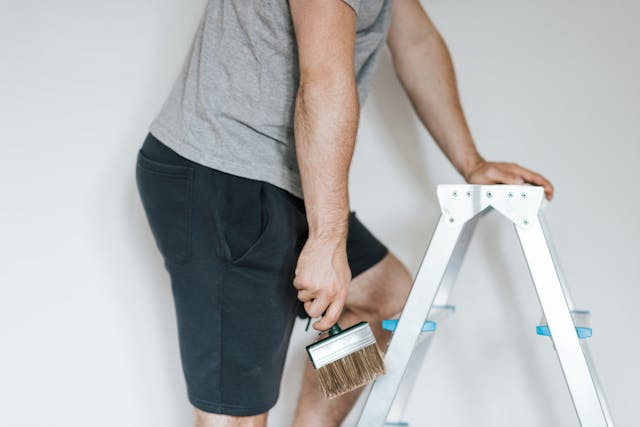Early in their careers, many painters prioritize their professional growth, often at the expense of their mental health and personal lives. With its unique demands and irregular work hours, the painting industry can quickly lead to burnout if not managed properly. Prioritizing strategies for maintaining well-being in the painting industry is essential for sustaining individual health and long-term career success. Balancing work with personal life empowers painters to achieve better health, greater work satisfaction, and enhanced productivity. This way, they’re setting a foundation for a fulfilling career.
Maintaining Well-being in the Painting Industry: The Importance of Work-Life Balance for Painters
Achieving work-life balance is vital across all professions, but it is important in the painting industry. Whether working on residential homes or large commercial projects, painters encounter unique demands that can strain physical and mental health.

Maintaining a healthy balance between work and personal life enhances job performance and ensures long-term well-being and career longevity. This balance is crucial for painters as it prevents burnout and fosters a more sustainable and satisfying career path. Putting their well-being first means painters can deliver high-quality work consistently while enjoying personal time that rejuvenates their creativity and energy. It’s a win-win!
Common Challenges Affecting Work-Life Balance
Painters face several specific challenges that can disrupt their work-life balance. The nature of the job often requires long hours on tight schedules, particularly when trying to meet client deadlines or capitalize on favorable weather conditions. Seasonal fluctuations in work volume can lead to periods of intense activity followed by times of little to no work, making consistent income and work-life balance difficult to achieve.
Moreover, the physical demands of painting, such as prolonged standing, bending, and exposure to potentially harmful chemicals, can lead to health issues if proper precautions aren’t taken. Financial pressures, especially for those just starting their businesses, can also contribute to stress and anxiety. Avoiding common mistakes when starting a painting business, such as underpricing services or neglecting legal requirements, is crucial for maintaining stability and reducing undue stress. These challenges highlight the importance of proactive strategies in managing the professional and personal aspects of life in the painting industry.
Strategies for Achieving Work-Life Balance
It’s easy to see why balancing work and personal life is crucial. However, maintaining this balance in real life is challenging, especially in the painting industry. So let’s learn several easy yet very effective methods to achieve this.

Time Management Skills
Effective time management is crucial for painters. Painters can avoid last-minute rushes and reduce stress by planning their schedules and prioritizing tasks based on deadlines and workload intensity. Techniques such as batching similar tasks and setting clear start and end times for the workday can help establish a more predictable routine.
Setting Boundaries
Communicating availability and realistic project timelines to clients helps set professional boundaries. Painters can manage client expectations by being clear about what can be realistically achieved within a given timeframe. It’s the surefire strategy for avoiding the pressure to overdeliver.
Setting boundaries is also an introduction to handling difficult customers. That can make all the difference in your work life, as it will teach you to prioritize your well-being (both mental and physical).
Health Focus
Regular health checks and consistent use of protective gear are vital for painters regularly exposed to potentially harmful substances. Maintaining physical health through proper safety practices is key to sustaining work-life balance.
Mental Health and Stress Management
Stress management techniques such as mindfulness, meditation, or simply taking regular breaks during the workday can significantly improve mental well-being. Engaging in hobbies or activities outside work helps maintain a healthy separation between professional and personal life.
Leveraging Technology and Tools
Another effective strategy is using technology to streamline work processes. Project management software can help painters keep track of projects and deadlines, which can massively reduce the mental load and prevent burnout.
Networking and Community Engagement
Another vital strategy is networking and community engagement. By connecting with other professionals in the industry, painters can share challenges, exchange tips, and support each other in finding a better balance.
This community involvement provides emotional support and opens up opportunities for collaborative projects. This can help distribute work more evenly and reduce individual workload pressures. It can also lead to a more enriched social life and a stronger sense of belonging, which are essential for overall well-being.
Employer’s Role in Facilitating Work-Life Balance
The painting industry’s employers are pivotal in promoting work-life balance for their teams. They can set the tone by implementing policies that accommodate the unique demands of painting jobs. Flexible scheduling, for instance, can allow painters to work at times that best suit their personal lives and physical well-being.
Employers can also support their staff by offering professional development opportunities that enhance job satisfaction and career growth. By fostering a workplace culture that values balance, employers strengthen their team’s overall well-being and improve productivity and loyalty among their staff.
Resources for Support and Growth
For painters seeking additional support, numerous resources are available that can significantly enhance their professional and personal development. Engaging with industry-specific organizations and online forums can provide painters valuable insights and community support.

At the same time, East Alabama Moving & Logistics services can be invaluable for those needing logistical assistance. Specializing in moving specialty items such as painting equipment, they ensure painters can set up new job sites efficiently and safely. Leveraging such specialized resources helps painters manage their operational needs more effectively and strengthen their ability to maintain a healthy work-life balance.
Put Yourself First
Implementing effective strategies for maintaining well-being in the painting industry is not just about managing workloads or setting boundaries. More importantly, it’s about creating a sustainable professional life that supports personal growth and stronger relationships. This approach improves individual health and helps you build stronger customer & community relationships, ensuring a thriving career that contributes positively to personal and community well-being.

